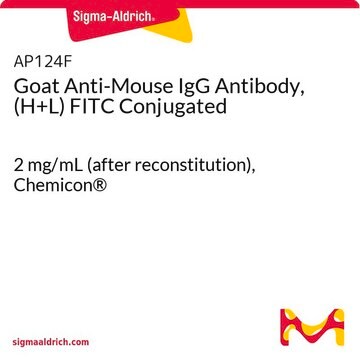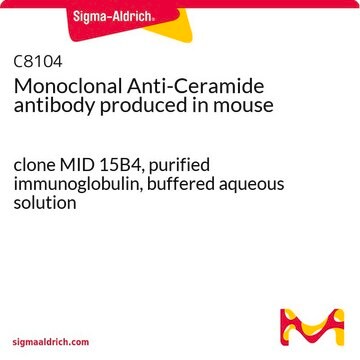MAB8002
Anti-Hepatitis E Virus Antibody, aa 434-457, clone 1E6
clone 1E6, Chemicon®, from mouse
Synonym(s):
HEV
Sign Into View Organizational & Contract Pricing
All Photos(1)
About This Item
UNSPSC Code:
12352203
eCl@ss:
32160702
NACRES:
NA.41
Recommended Products
biological source
mouse
Quality Level
antibody form
purified immunoglobulin
antibody product type
primary antibodies
clone
1E6, monoclonal
species reactivity
human
manufacturer/tradename
Chemicon®
technique(s)
ELISA: suitable
immunofluorescence: suitable
western blot: suitable
isotype
IgG2b
shipped in
wet ice
Specificity
ORF2.1, encoded region to capsid protein
Immunogen
Epitope: aa 434-457
Application
Anti-Hepatitis E Virus Antibody, aa 434-457, clone 1E6 detects level of Hepatitis E Virus & has been published & validated for use in WB, ELISA & IF.
ELISA
Immunoblotting
Immunofluorescence
Optimal dilutions must be determined by end user.
Immunoblotting
Immunofluorescence
Optimal dilutions must be determined by end user.
Research Category
Infectious Diseases
Infectious Diseases
Research Sub Category
Infectious Diseases - Viral
Infectious Diseases - Viral
Physical form
Format: Purified
Liquid in 0.02M PB with 0.25M NaCl, pH 7.6. Contains 0.1% sodium azide.
Storage and Stability
Store at 2° to 8°C for up to 12 months from date of receipt.
Other Notes
Concentration: Please refer to the Certificate of Analysis for the lot-specific concentration.
Legal Information
CHEMICON is a registered trademark of Merck KGaA, Darmstadt, Germany
Disclaimer
Unless otherwise stated in our catalog or other company documentation accompanying the product(s), our products are intended for research use only and are not to be used for any other purpose, which includes but is not limited to, unauthorized commercial uses, in vitro diagnostic uses, ex vivo or in vivo therapeutic uses or any type of consumption or application to humans or animals.
Not finding the right product?
Try our Product Selector Tool.
Storage Class Code
10 - Combustible liquids
WGK
WGK 2
Flash Point(F)
Not applicable
Flash Point(C)
Not applicable
Certificates of Analysis (COA)
Search for Certificates of Analysis (COA) by entering the products Lot/Batch Number. Lot and Batch Numbers can be found on a product’s label following the words ‘Lot’ or ‘Batch’.
Already Own This Product?
Find documentation for the products that you have recently purchased in the Document Library.
Changbo Qu et al.
Archives of virology, 162(10), 2989-2996 (2017-06-18)
Hepatitis E virus (HEV) infection has emerged as a global health issue, but no approved medication is available. The nucleoside analogue 2'-C-methylcytidine (2CMC), a viral polymerase inhibitor, has been shown to inhibit infection with a variety of viruses, including hepatitis
Yunlong Li et al.
Antiviral research, 197, 105228-105228 (2021-12-21)
Hepatitis E virus (HEV) infection can cause severe acute hepatitis in pregnant women and chronic infection in immunocompromised patients, promoting the development of effective antiviral therapies. In this study, we identified niclosamide, a widely used anthelmintic drug, as a potent
Yifei Yang et al.
Emerging microbes & infections, 12(2), 2276336-2276336 (2023-10-26)
Hepatitis E virus (HEV) has become one of the important pathogens that threaten the global public health. Type 3 and 4 HEV are zoonotic, which can spread vertically and cause placental damage. At the same time, autophagy plays an important
Fabian Z X Lean et al.
The Journal of general virology, 103(11) (2022-11-11)
Ferrets are widely used for experimental modelling of viral infections. However, background disease in ferrets could potentially confound intended experimental interpretation. Here we report the detection of a subclinical infection of ferret hepatitis E virus (FRHEV) within a colony sub-group
Martijn D B van de Garde et al.
Journal of virology, 90(9), 4394-4401 (2016-02-19)
Genotype 3 (gt3) hepatitis E virus (HEV) infections are emerging in Western countries. Immunosuppressed patients are at risk of chronic HEV infection and progressive liver damage, but no adequate model system currently mimics this disease course. Here we explore the
Our team of scientists has experience in all areas of research including Life Science, Material Science, Chemical Synthesis, Chromatography, Analytical and many others.
Contact Technical Service



